The Cop and the Anthem警察与赞美诗读后感
- 格式:doc
- 大小:30.00 KB
- 文档页数:2
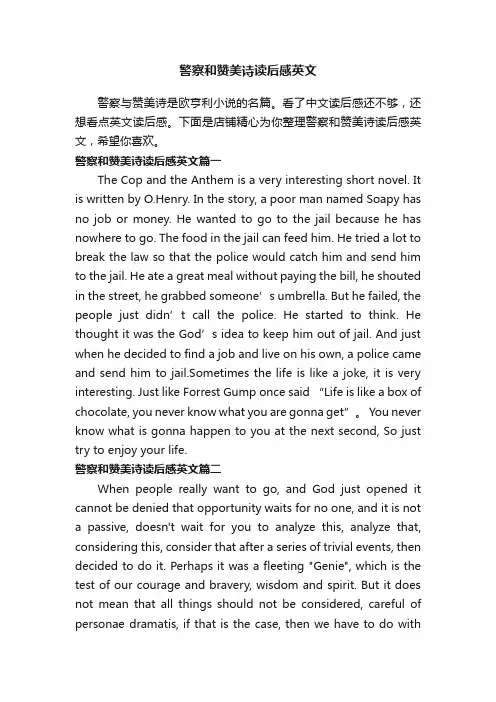
警察和赞美诗读后感英文警察与赞美诗是欧亨利小说的名篇。
看了中文读后感还不够,还想看点英文读后感。
下面是店铺精心为你整理警察和赞美诗读后感英文,希望你喜欢。
警察和赞美诗读后感英文篇一The Cop and the Anthem is a very interesting short novel. It is written by O.Henry. In the story, a poor man named Soapy has no job or money. He wanted to go to the jail because he has nowhere to go. The food in the jail can feed him. He tried a lot to break the law so that the police would catch him and send him to the jail. He ate a great meal without paying the bill, he shouted in the street, he grabbed someone’s umbrella. But he failed, the people just didn’t call the police. He started to think. He thought it was the God’s idea to keep him out of jail. And just when he decided to find a job and live on his own, a police came and send him to jail.Sometimes the life is like a joke, it is very interesting. Just like Forrest Gump once said “Life is like a box of chocolate, you never know what you are gonna get”。
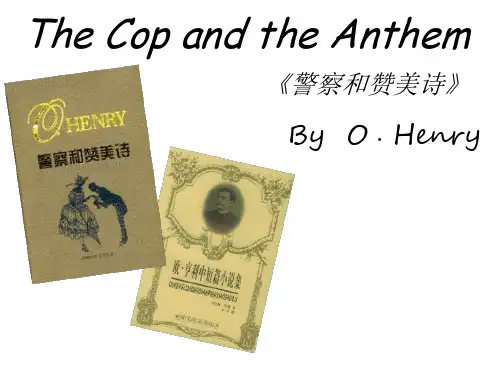
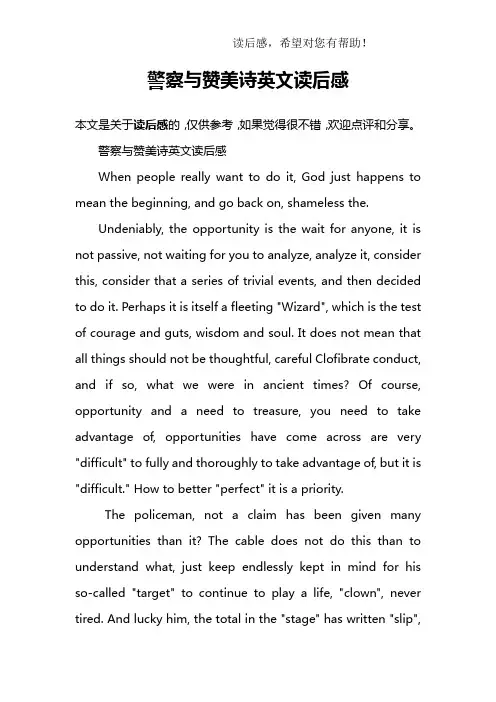
警察与赞美诗英文读后感本文是关于读后感的,仅供参考,如果觉得很不错,欢迎点评和分享。
警察与赞美诗英文读后感When people really want to do it, God just happens to mean the beginning, and go back on, shameless the.Undeniably, the opportunity is the wait for anyone, it is not passive, not waiting for you to analyze, analyze it, consider this, consider that a series of trivial events, and then decided to do it. Perhaps it is itself a fleeting "Wizard", which is the test of courage and guts, wisdom and soul. It does not mean that all things should not be thoughtful, careful Clofibrate conduct, and if so, what we were in ancient times? Of course, opportunity and a need to treasure, you need to take advantage of, opportunities have come across are very "difficult" to fully and thoroughly to take advantage of, but it is "difficult." How to better "perfect" it is a priority.The policeman, not a claim has been given many opportunities than it? The cable does not do this than to understand what, just keep endlessly kept in mind for his so-called "target" to continue to play a life, "clown", never tired. And lucky him, the total in the "stage" has written "slip",but in the end was as a "joke", laughed.A "drama" in the end, which means another "Drama" begins. The police is concerned, only to routine; on the reader, but near the end; of life is concerned, only a small episode; of the writer is concerned, it is a good plot; on the audience, the only worthy of a ticket; on Soapy, it is a new idea of life close to, for he had the "ignorance" to pay, value is what he does not escape from his hand, he may be able to reverse the fate of the "Opportunity" and its contempt for the lessons learned in the final result.If he will blame anyone, so that he does deserve it; if he can only blame himself, then he can say to yourself out loud: "Three months, not too long, I will cherish and seize the time each day . well, in fact, did not run away, but I ignored. wait for it … … "Well, in fact, did not go far. Yes, a lot of happiness to dominate, the opportunity is one of them. Do not wait until God impatient, after all, he has emotions, give you played rough, then, as if too lacking in "human touch" of the. But their suffering.Cherish the people or things around them, they change every day, but we are too busy, did not see. Opportunity is likea chance encounter, a good thing. Take advantage of, the benefits of it to play the extreme, it is a "beauty" thing. A person's life will be all sorts of conditions, each of the significance of the situation is very different, very different. Select a different situation, a different life, a different fate, a different change … … So, we have to opportunity, "transparent", fully see, so that would not go astray friends.If the contrary, the outcome would be like Soapy: horror, realize that they have plunged into the abyss, the fallen years, shameful desire, despair, only poor intellectual exhaustion, motivation despicable.Not grasp the opportunity to meet, are fools; not met but know how to grasp opportunities is talent; both opportunities and understanding of how the event is a genius.感谢阅读,希望能帮助您!。
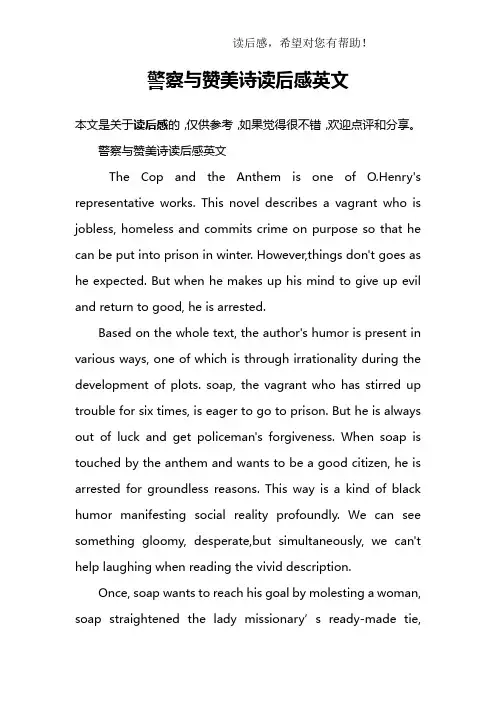
警察与赞美诗读后感英文本文是关于读后感的,仅供参考,如果觉得很不错,欢迎点评和分享。
警察与赞美诗读后感英文The Cop and the Anthem is one of O.Henry's representative works. This novel describes a vagrant who is jobless, homeless and commits crime on purpose so that he can be put into prison in winter. However,things don't goes as he expected. But when he makes up his mind to give up evil and return to good, he is arrested.Based on the whole text, the author's humor is present in various ways, one of which is through irrationality during the development of plots. soap, the vagrant who has stirred up trouble for six times, is eager to go to prison. But he is always out of luck and get policeman's forgiveness. When soap is touched by the anthem and wants to be a good citizen, he is arrested for groundless reasons. This way is a kind of black humor manifesting social reality profoundly. We can see something gloomy, desperate,but simultaneously, we can't help laughing when reading the vivid description.Once, soap wants to reach his goal by molesting a woman, soap straightened the lady missionary’s ready-made tie,dragged his shrinking cuffs into the open, set his hat at a killing cant and sidled toward the young women.but the seeming virtuous and quiet woman begin to seduce him in reverse.“Sure, Mike,” she said joyfully, “if you’ll blow me to a pail of suds. I’d have spoke to you sooner, but the cop was watching.”With the young woman playing the clinging ivy to his oak soap . Besides, soap steals an umbrella from a neatly dressed customer, but the umbrella is ill-gotten originally.''Of course,''said the umbrella man''that is—well, you know how these mistakes occur—I—if it’s your umbrella I hope you’ll excuse me—I picked it up this morning in a restaurant—If you recognise it as yours, why—I hope you’ll.So the modest and lady and gentleman turn out to be someone that we cannot imagine, which is not rational. Nonetheless, as a matter of fact, they just hide their dirty acts under a beautiful veil and a small sign can indicate a great trend, we can learn that the so-called noble upper class goes more serious than the two. These plots reveals awful mood of that capitalist society.In addition, the conflict between the irrationality of Soap's behavior and the rationality of the cop's judgment is one of the important reasons for Soap's "misfortune". For example, soap breaks the glass and wait for the policeman to come andarrest him, but the cop reckons that a man who commits evil won't sit and wait for arrest, men who smash windows do not remain to parley with the law’s minions then he excludes soap. Besides, he wants to break the peace by virtue of kicking up a fuss in the street, identically, the cop deems that only college students dare to be so unbridled and boisterous''Tis one of them Yale lads celebrate’ the goose egg they give to the Hartford College. Noisy; but no harm. We have instructions to lave them be. His abnormal conducts is determined by his distorted mentality, which exactly reflects torture and agony both in life and mind oft he low-class. When the poor guy intends to do good the moment he is moved and inspired, the cop believes a vagrant will never something to do with the quiet atmosphere around a church, the soft lamplight and the touching music. Consequently, soap is caught unexpectedly. “What are you doing here?” asked the officer. ''Nothing,'' said soap''Then come along.''said the policeman. ''Three months on the Island.'' said the Magistrate in the Police Court the next morning It is the accident that mirrors confusion of truth and falsehood, black and wright.Needless to say,there are many ways to represent humor, they have one thing in common--where there is humor, thereis specific implication. The writing style of the author is humorous, the disclosure of the society is deepgoing, the reflective life andmental distress are mirky. O.Henry uses a quantity of comparison and humor to fully display the character's wretched fate and cruelty of capitalist society.感谢阅读,希望能帮助您!。
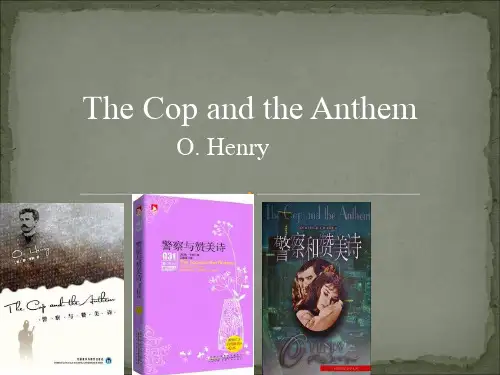

英语短篇小说选读期末论文从《警察与赞美诗》分析欧·亨利写作特点Abstract: O Henry ,one of the most famous writers in America, is well-known for his short story . He is also the founder of modern short story of America. He called in the master layout posed, with his own style. His story is famous for depicting life of middle and lower classes, humorous language, and unexpected ends. The Cop and the Anthem is one of his famous and typical story. He expresses the helpless and misery of common people, meaningful and impressed, with tears inside laugh, through the depicting of Soapy. This is a typical one, from which we can clearly draw out his writing feature--considering about the life of common people; depicting people by using exaggerate and humor as technique; and unexpected endings.内容摘要:欧·亨利20世纪初美国著名短篇小说家,美国现代短篇小说创始人。
与法国的莫泊桑、俄国的契诃夫并称为世界三大短篇小说巨匠。
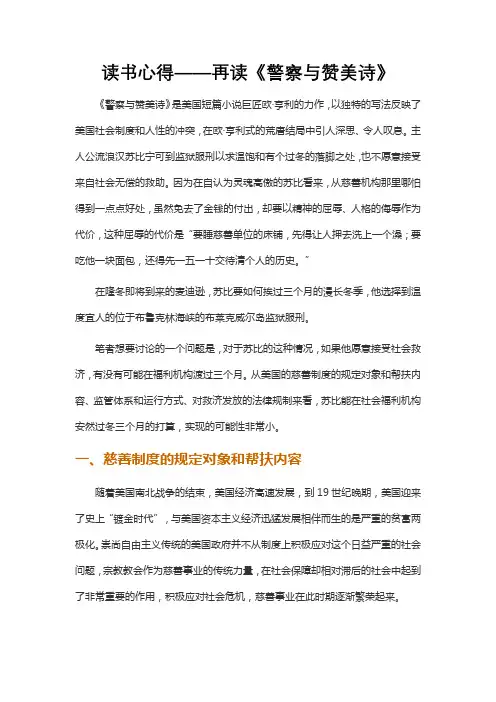
读书心得——再读《警察与赞美诗》《警察与赞美诗》是美国短篇小说巨匠欧·亨利的力作,以独特的写法反映了美国社会制度和人性的冲突,在欧·亨利式的荒唐结局中引人深思、令人叹息。
主人公流浪汉苏比宁可到监狱服刑以求温饱和有个过冬的落脚之处,也不愿意接受来自社会无偿的救助。
因为在自认为灵魂高傲的苏比看来,从慈善机构那里哪怕得到一点点好处,虽然免去了金钱的付出,却要以精神的屈辱、人格的侮辱作为代价,这种屈辱的代价是“要睡慈善单位的床铺,先得让人押去洗上一个澡;要吃他一块面包,还得先一五一十交待清个人的历史。
”在隆冬即将到来的麦迪逊,苏比要如何挨过三个月的漫长冬季,他选择到温度宜人的位于布鲁克林海峡的布莱克威尔岛监狱服刑。
笔者想要讨论的一个问题是,对于苏比的这种情况,如果他愿意接受社会救济,有没有可能在福利机构渡过三个月。
从美国的慈善制度的规定对象和帮扶内容、监管体系和运行方式、对救济发放的法律规制来看,苏比能在社会福利机构安然过冬三个月的打算,实现的可能性非常小。
一、慈善制度的规定对象和帮扶内容随着美国南北战争的结束,美国经济高速发展,到19世纪晚期,美国迎来了史上“镀金时代”,与美国资本主义经济迅猛发展相伴而生的是严重的贫富两极化。
崇尚自由主义传统的美国政府并不从制度上积极应对这个日益严重的社会问题,宗教教会作为慈善事业的传统力量,在社会保障却相对滞后的社会中起到了非常重要的作用,积极应对社会危机,慈善事业在此时期逐渐繁荣起来。
小说同时代的美国慈善情况大致有以下几种类型,同时,分别看一下对苏比的适用性:1.新美国基督教会联合会。
1905年时由美国的33个教会组织成立的,宗旨是帮助城市中信教和不信教的贫穷居民。
他们先是用游行乐队和生动的演说来吸引底层穷人的注意力,然后在提供食物、帮助和工作的同时对其进行道德说教,并对他们宣讲中产阶级的生活美德。
作为美国底层人民代表之一的苏比,他最需的最大最急迫的帮助是食物和住宿,并不是工作。
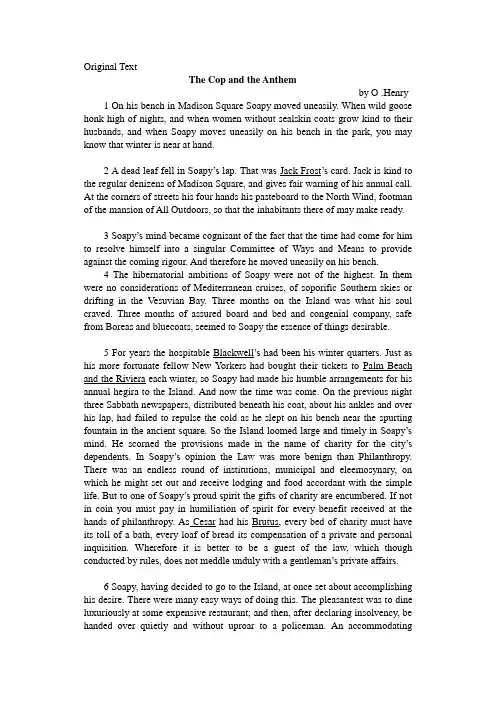
Original TextThe Cop and the Anthemby O .Henry1 On his bench in Madison Square Soapy moved uneasily. When wild goose honk high of nights, and when women without sealskin coats grow kind to their husbands, and when Soapy moves uneasily on his bench in the park, you may know that winter is near at hand.2 A dead leaf fell in Soapy’s lap. That was Jack Frost’s card. Jack is kind to the regular denizens of Madison Square, and gives fair warning of his annual call. At the corners of streets his four hands his pasteboard to the North Wind, footman of the mansion of All Outdoors, so that the inhabitants there of may make ready.3 Soapy’s mind became cognisant of the fact that the time had come for him to resolve himself into a singular Committee of Ways and Means to provide against the coming rigour. And therefore he moved uneasily on his bench.4 The hibernatorial ambitions of Soapy were not of the highest. In them were no considerations of Mediterranean cruises, of soporific Southern skies or drifting in the Vesuvian Bay. Three months on the Island was what his soul craved. Three months of assured board and bed and congenial company, safe from Boreas and bluecoats, seemed to Soapy the essence of things desirable.5 For years the hospitable Blackwell’s had been his winter quarters. Just as his more fortunate fellow New Yorkers had bought their tickets to Palm Beach and the Riviera each winter, so Soapy had made his humble arrangements for his annual hegira to the Island. And now the time was come. On the previous night three Sabbath newspapers, distributed beneath his coat, about his ankles and over his lap, had failed to repulse the cold as he slept on his bench near the spurting fountain in the ancient square. So the Island loomed large and timely in Soapy’s mind. He scorned the provisions made in the name of charity for the city’s dependents. In Soapy’s opinion the Law was more benign than Philanthropy. There was an endless round of institutions, municipal and eleemosynary, on which he might set out and receive lodging and food accordant with the simple life. But to one of Soapy’s proud spirit the gifts of charity are encumbered. If not in coin you must pay in humiliation of spirit for every benefit received at the hands of philanthropy. As Cesar had his Brutus, every bed of charity must have its toll of a bath, every loaf of bread its compensation of a private and personal inquisition. Wherefore it is better to be a guest of the law, which though conducted by rules, does not meddle unduly with a gentleman’s private affairs.6 Soapy, having decided to go to the Island, at once set about accomplishing his desire. There were many easy ways of doing this. The pleasantest was to dine luxuriously at some expensive restaurant; and then, after declaring insolvency, be handed over quietly and without uproar to a policeman. An accommodatingmagistrate would do the rest.7 Soapy left his bench and strolled out of the square and across the level sea of asphalt, where Broadway and Fifth Avenue flow together. Up Broadway he turned, and halted at a glittering café, where are gathered together nightly the choicest products of the grape, the silkworm and the protoplasm.8 Soapy had confidence in himself from the lowest button of his vest upward. He was shaven, and his coat was decent and his neat black, ready-tied four-in-hand had been presented to him by a lady missionary on Thanksgiving Day. If he could reach a table in the restaurant unsuspected, success would be his. The portion of him that would show above the table would raise no doubt in the waiter’s mind. A roasted mallard duck, thought Soapy, would be about the thing—with a bottle of Chablis, and then Camembert, a demi-tasse and a cigar. One dollar for the cigar would be enough. The total would not be so high as to call forth any supreme manifestation of revenge from the café management; and yet the meat would leave him filled and happy for the journey to his winter refuge.9 But as Soapy set foot inside the restaurant door the head waiter’s eye fell upon his frayed trousers and decadent shoes. Strong and ready hands turned him about and conveyed him in silence and haste to the sidewalk and averted the ignoble fate of the menaced mallard.10 Soapy turned off Broadway. It seemed that his route to the coveted island was not to be an epicurean one. Some other way of entering limbo must be thought of.11 At a corner of Sixth Avenue electric lights and cunningly displayed wares behind plate-glass made a shop window conspicuous. Soapy took a cobble-stone and dashed it through the glass. People came running round the corner, a policeman in the lead. Soapy stood still, with his hands in his pockets, and smiled at the sight of brass buttons.12 “Where’s the man that done that?” inquired the officer excitedly.13 “Don’t you figure out that I might have had something to do with it?” said Soapy, not without sarcasm, but friendly, as one greets good fortune.14 The pol iceman’s mind refused to accept Soapy even as a clue. Men who smash windows do not remain to parley with the law’s minions. They take to their heels. The policeman saw a man halfway down the block running to catch a car. With drawn club he joined in the pursuit. Soapy, with disgust in his heart, loafed along, twice unsuccessful.15 On the opposite side of the street was a restaurant of no great pretensions. It catered to large appetites and modest purses. Its crockery and atmosphere were thick; its soup and napery thin. Into this place Soapy took his accusive shoes and tell-tale trousers without challenge. At a table he sat and consumed beefsteak, flap-jacks, doughnuts, and pie. And then to the waiter he betrayed the fact that the minutest coin and himself were strangers.16 “Now, get busy and call a cop,” said Soapy. “And don’t keep a gentlemanwaiting.”16 “No cop for youse,” said the waiter, with a voice like butter cakes and an eye like the cherry in a Manhattan cocktail. “Hey, Con!”17 Neatly upon his left ear on the callous pavement two waiters pitched Soapy. He arose, joint by joint, as a carpenter’s rule opens, and beat the dust from his clothes. Arrest seemed but a rosy dream. The Island seemed very far away. A policeman who stood before a drug store two doors away laughed and walked down the street.18 Five blocks Soapy travelled before his courage permitted him to woo capture again. This time the opportunity presented what he fatuously termed to himself a “cinch.” A young woman of a modest and pleasing guise was standing before a show window gazing with sprightly interest at its display of shaving mugs and inkstands, and two yards from the window a large policeman of severe demeanour leaned against a water-plug.19 It was Soapy’s design to assume the rule of the despicable and execrated “masher.” The refined and elegant appearance of his victim and the contiguity of the conscientious cop encouraged him to believe that he would soon feel the pleasant official clutch upon his arm that would ensure his winter quarters of the right little, tight little isle.20 Soapy straightened the lady missionary’s ready-made tie, dragged his shrinking cuffs into the open, set his hat at a killing cant and sidled toward the young women. He made e yes at her, was taken with sudden coughs and “hems,” smiled, smirked, and went brazenly through the impudent and contemptible litany of the “masher.” With half an eye Soapy saw that the policeman was watching him fixedly. The young woman moved away a few steps, and again bestowed her absorbed attention upon the shaving mugs. Soapy followed, boldly stepping to her side, raised his hat and said: “Ah there, Bedelia! Don’t you want to come and play in my yard?”21 The policeman was still looking. The persecuted young woman had but to beckon a finger and Soapy would be practically en route for his insular haven. Already he imagined he could feel the cosy warmth of the station-house. The young woman faced him and, stretching out a hand, caught Soapy’s coat slee ve.22 “Sure, Mike,” she said joyfully, “if you’ll blow me to a pail of suds. I’d have spoke to you sooner, but the cop was watching.”With the young woman playing the clinging ivy to his oak Soapy walked past the policeman overcome with gloom. He seemed doomed to liberty.23 At the next corner he shook off his companion and ran. He halted in the district where by night are found the lightest streets, hearts, vows, and librettos. Women in furs and men in greatcoats moved gaily in the wintry air. A sudden fear seized Soapy that some dreadful enchantment had rendered him immune to arrest. The thought brought a little of panic upon it, and when he came upon anotherpoliceman lounging grandly in front of a transplendent theatre he caught at the immediate straw of “disorderly conduct.”24 On the sidewalk Soapy began to yell drunken gibberish at the top of his harsh voice. He danced, howled, raved, and otherwise disturbed the welkin.25 The policeman twirled his club, turned his back to Soapy and remarked toa citizen: “Tis one of them Yale lads celebratin’ the goose egg they give to the Hartford College. Noisy; but no harm. We’ve instructions to lave them be.”26 Disconsolate, Soapy ceased his unavailing racket. Would never a policeman lay hands on him? In his fancy the Island seemed an unattainable Arcadia. He buttoned his thin coat against the chilling wind.27 In a cigar store he saw a well-dressed man lighting a cigar at a swinging light. His silk umbrella he had set by the door on entering. Soapy stepped inside, secured the umbrella and sauntered off with it slowly. The man at the cigar light followed hastily.28 “My umbrella,” he said sternly.29 “Oh, is it?” sneered Soapy, adding insult to petit larceny. “Well, why don’t you call a policeman? I took it. Your umbrella! Why don’t you call a cop? There stands one on the corner.”30 The umbrella owner slowed his steps. Soapy did likewise, with a presentiment that luck would run against him. The policeman looked at the two curiously.31“Of course,” said the umbrella man—“that is—well, you know how these mistakes occur—I—if it’s your umbrella I hope you’ll excuse me—I picked it up this morning in a restaurant—If you recognise it as yours, why—I hope you’ll—“32 “Of course it’s mine,” said Soapy viciously.33 The ex-umbrella man retreated. The policeman hurried to assist a tall blonde in an opera cloak across the street in front of a street car that was approaching two blocks away.34 Soapy walked eastward through a street damaged by improvements. He hurled the umbrella wrathfully into an excavation. He muttered against the men who wear helmets and carry clubs. Because he wanted to fall into their clutches, they seemed to regard him as a king who could do no wrong.35 At length Soapy reached one of the avenues to the east where the glitter and turmoil was but faint. He set his face down this toward Madison Square, for the homing instinct survives even when the home is a park bench.36 But on an unusually quiet corner Soapy came to a standstill. Here was an old church, quaint and rambling and gabled. Through one violet-stained window a soft light glowed, where, no doubt, the organist loitered over the keys, making sure of his mastery of the coming Sabbath anthem. For there drifted out to Soapy’s ears sweet music that caught and held him transfixed against the convolutions of the iron fence.37 The moon was above, lustrous and serene; vehicles and pedestrains were few; sparrows twittered sleepily in the eaves—for a little while the scene mighthave been a country churchyard. And the anthem that the organist played cemented Soapy to the iron fence, for he had known it well in the days when his life contained such things as mothers and roses and ambitions and friends and immaculate thoughts and collars.38 The conjunction of Soapy’s receptive state of mind and the influences about the old church wrought a sudden and wonderful change in his soul. He viewed with swift horror the pit into which he had tumbled, the degraded days, unworthy desires, dead hopes, wrecked faculties, and base motives that made up his existence.39 And also in a moment his heart responded thrillingly to this novel mood. An instantaneous and strong impulse moved him to battle with his desperate fate. He would pull himself out of the mire; he would make a man of himself again; he would conquer the evil that had taken possession of him. There was time; he was comparatively young yet; he would resurrect his old eager ambitions and pursue them without faltering. Those solemn but sweet organ notes had set up a revolution in him. Tomorrow he would go into the roaring down-town district and find work. A fur importer had once offered him a place as driver. He would find him to-morrow and ask for the position. He would be somebody in the world. He would—40 Soapy felt a hand laid on his arm. He looked quickly round into the broad face of a policeman.41 “What are you doin’ here?” asked the officer.42 “Nothing’,” said Soapy.43“Then come along,” said the polic eman.44“Three months on the Island,” said the Magistrate in the Police Court the next morning.。
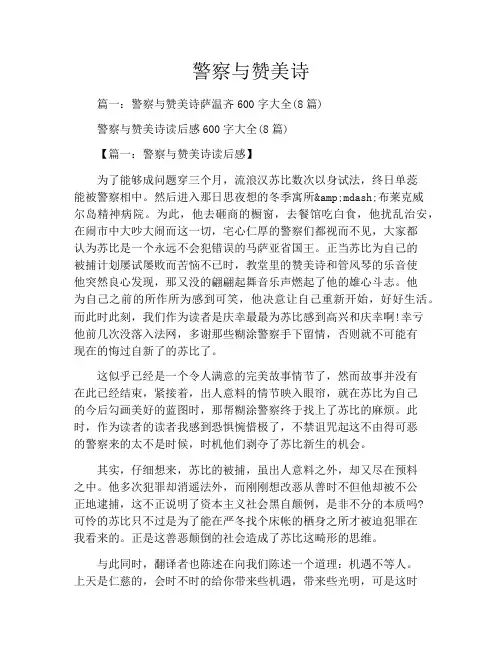
警察与赞美诗篇一:警察与赞美诗萨温齐600字大全(8篇)警察与赞美诗读后感600字大全(8篇)【篇一:警察与赞美诗读后感】为了能够成问题穿三个月,流浪汉苏比数次以身试法,终日单蕊能被警察相中。
然后进入那日思夜想的冬季寓所—布莱克威尔岛精神病院。
为此,他去砸商的橱窗,去餐馆吃白食,他扰乱治安,在闹市中大吵大闹而这一切,宅心仁厚的警察们都视而不见,大家都认为苏比是一个永远不会犯错误的马萨亚省国王。
正当苏比为自己的被捕计划屡试屡败而苦恼不已时,教堂里的赞美诗和管风琴的乐音使他突然良心发现,那又没的翩翩起舞音乐声燃起了他的雄心斗志。
他为自己之前的所作所为感到可笑,他决意让自己重新开始,好好生活。
而此时此刻,我们作为读者是庆幸最最为苏比感到高兴和庆幸啊!幸亏他前几次没落入法网,多谢那些糊涂警察手下留情,否则就不可能有现在的悔过自新了的苏比了。
这似乎已经是一个令人满意的完美故事情节了,然而故事并没有在此已经结束,紧接着,出人意料的情节映入眼帘,就在苏比为自己的今后勾画美好的蓝图时,那帮糊涂警察终于找上了苏比的麻烦。
此时,作为读者的读者我感到恐惧惋惜极了,不禁诅咒起这不由得可恶的警察来的太不是时候,时机他们剥夺了苏比新生的机会。
其实,仔细想来,苏比的被捕,虽出人意料之外,却又尽在预料之中。
他多次犯罪却消遥法外,而刚刚想改恶从善时不但他却被不公正地逮捕,这不正说明了资本主义社会黑自颠例,是非不分的本质吗?可怜的苏比只不过是为了能在严冬找个床帐的栖身之所才被迫犯罪在我看来的。
正是这善恶颠倒的社会造成了苏比这畸形的思维。
与此同时,翻译者也陈述在向我们陈述一个道理:机遇不等人。
上天是仁慈的,会时不时的给你带来些机遇,带来些光明,可是这时你若不好好珍惜,那么上天又会展示出他吝啬的一面。
我们唯一能做的,就是做一个能够发现机遇又领会需要机遇的天才。
在生活中,我也曾经错失过很多商机,后悔过也懊恼过,但是值得庆幸的是,在错失给予之后,我学会了争取和珍惜。
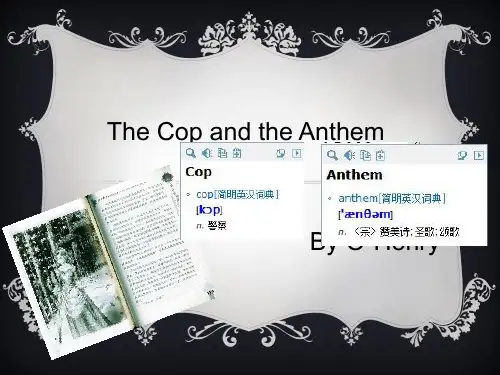
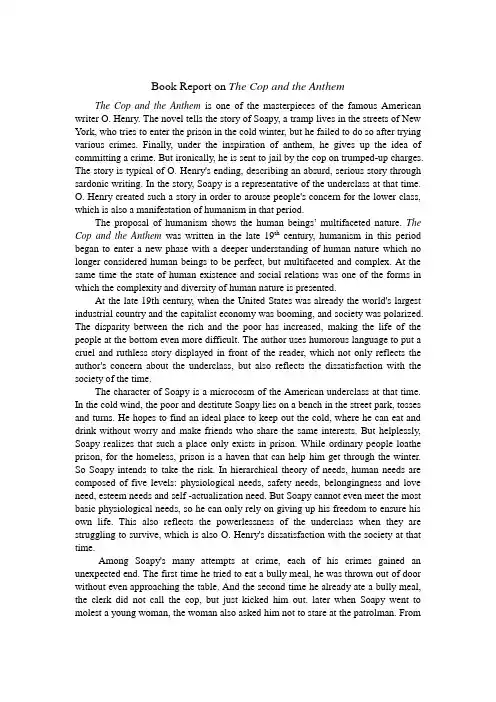
Book Report on The Cop and the AnthemThe Cop and the Anthem is one of the masterpieces of the famous American writer O. Henry. The novel tells the story of Soapy, a tramp lives in the streets of New York, who tries to enter the prison in the cold winter, but he failed to do so after trying various crimes. Finally, under the inspiration of anthem, he gives up the idea of committing a crime. But ironically, he is sent to jail by the cop on trumped-up charges. The story is typical of O. Henry's ending, describing an absurd, serious story through sardonic writing. In the story, Soapy is a representative of the underclass at that time. O. Henry created such a story in order to arouse people's concern for the lower class, which is also a manifestation of humanism in that period.The proposal of humanism shows the human beings’ multifaceted nature. The Cop and the Anthem was written in the late 19th century, humanism in this period began to enter a new phase with a deeper understanding of human nature which no longer considered human beings to be perfect, but multifaceted and complex. At the same time the state of human existence and social relations was one of the forms in which the complexity and diversity of human nature is presented.At the late 19th century, when the United States was already the world's largest industrial country and the capitalist economy was booming, and society was polarized. The disparity between the rich and the poor has increased, making the life of the people at the bottom even more difficult. The author uses humorous language to put a cruel and ruthless story displayed in front of the reader, which not only reflects the author's concern about the underclass, but also reflects the dissatisfaction with the society of the time.The character of Soapy is a microcosm of the American underclass at that time. In the cold wind, the poor and destitute Soapy lies on a bench in the street park, tosses and turns. He hopes to find an ideal place to keep out the cold, where he can eat and drink without worry and make friends who share the same interests. But helplessly, Soapy realizes that such a place only exists in prison. While ordinary people loathe prison, for the homeless, prison is a haven that can help him get through the winter. So Soapy intends to take the risk. In hierarchical theory of needs, human needs are composed of five levels: physiological needs, safety needs, belongingness and love need, esteem needs and self -actualization need. But Soapy cannot even meet the most basic physiological needs, so he can only rely on giving up his freedom to ensure his own life. This also reflects the powerlessness of the underclass when they are struggling to survive, which is also O. Henry's dissatisfaction with the society at that time.Among Soapy's many attempts at crime, each of his crimes gained an unexpected end. The first time he tried to eat a bully meal, he was thrown out of door without even approaching the table. And the second time he already ate a bully meal, the clerk did not call the cop, but just kicked him out. later when Soapy went to molest a young woman, the woman also asked him not to stare at the patrolman. Fromthe description of this detail, we can feel the distrust of the cop in the midst of the chaotic society.The climax of this story is precisely the most absurd episode of the whole story. While Soapy is infected by the anthem coming out from an old church that he passes by, he planned to give up crime and become a good citizen. However, the cop appeared out of nowhere and put him in jail on a trumped-up charge. Such dramatic mockery is not only a mapping of the miserable life of the underclass, but also an irony of the chaotic rule of law order of American society at that time.The "cop" is the holder and enforcer of the law, representing the ruling class power, a symbol of political civilization; while the "anthem" represents the spiritual power of religious morality, a symbol of spiritual civilization. The "anthem" is the spiritual power in the religious kingdom, which can evoke the memory about "love, ambition, friend, pure" that Soapy had lost; it can make him "abhor the abyss into which he had fallen, the depraved life" and make him "struggle against to the miserable destiny"; "pull himself out of the mire "; "to be a man again". However, under the cop's brutal intervention, the spark of optimism was extinguished instantly. In the face of powerful political violence, even such a powerful spiritual force as "anthem" was unable to change Soapy's fate. There is a huge contrast between a strong political civilization and a weak spiritual civilization. Although "cop" and "anthem" are formally aligned as equals in the title, they are not equal as two forces that govern the choice of human existence. In the dichotomy between the cop and the anthem, the state power represented by the "cop" always dominates and controls the spiritual power represented by the "anthem.O. Henry's lively and humorous language allows the reader to be in the streets of New York City, witnessing the difficult life of the underclass like Soapy; see the surface of the glamorous, but in fact dirty, vulgar American society; understand the nature of the American judicial system and social system. Soapy's misfortune contains a "serious philosophy of life": the fate of people like Soapy at the bottom of the social ladder in American society is destined to be a tragedy. One cannot escape from the predicament of the human being, but can only go from the predicament to the other predicament.。
When I was in middle school,my Chinese teacher had introduced us that O.Henry was one of the most famous short story novelist.And he was widely regarded as the father of modern American short story. His works often had an impressive characterist that the ending of the works must be. contrary to your expectation..From where I stand ,I appreciate this type of works completely.first it catch my attention all the time until it ends.i feel absorbed in it and eagerly want to know the ending.attracting readers attentions ,in my opinion ,is the most important factor to a story.second,an dramatic ending will give the reader an impressive impression at the end and get the readers to deeply think about the theme that the author want to tell us .It is what the saying say that good works always teach people a lot . The Gift of the Magi and The cop and the Anthem are the typical stories of this characterist .Apart from this story theme,it is a very funny story.Soapy ,the character,was a penniless and homeless tramp who lived in Madison Square .Faced with the coming of winter,he had to find some ways that can help him pass the cold winter happily and savely Then he remembered his winter life in Blackwell Island. “Three months on the Island was what his soul craved. Three months of assured board and bed and congenial company, safe from Boreas and bluecoats, seemed to Soapy the essence of things desirable”Soapy thought.So he decided to break the law then he would be sent to the Island by the police .thinking about this ,he set out to do it.At first he didn’t pay for his meal on purpose in a restaurant ,hoping that the waiter would call the police.but the waiter only to rely him that No cop for youse and pitched Soapy.then he pretended to be despicable and execrated “masher.”to flirt with a elegant lady.but to his surprise,the elegant lady was a harlot.Eventually no matter what kinds of bad things he had done,the cop never arrested him. “He muttered against the men who wear helmets and carry clubs. Because he wanted to fall into their clutches, they seemed to regard him as a king who could do no wrong.”With too much disappointment,Soapy came to a standstill.Here was a old church. . For there drifted out to Soapy’s ears sweet music that caught and held him transfixed ag ainst the convolutions of the iron fence. the influences about the old church wrought a sudden and wonderful change in his soul An instantaneous and strong impulse moved him to battle with his desperate fate .he said to himself that some day he will be somebody in the future as long as he tries his best. However a cop came to him when he was thiking about his excellent future “ What are you doin’ here?” asked the officer.“Nothing’,” said Soapy.“Then come along,” said the policeman.“Three months on the Island,” said the Magistrate in the Police Court the next morning.How ridiculous and dramatic the ending was.when Soapy spared every effort to break the law in order that he would be arrested and sent to the Island,the cop treated him as a king that who could do no wrong.”finally he was arrested only because he was sitting near the church to appreciate the sweet music and plan his successful future.As far as I concerned,this kind of writing pattern stand out the decayed and disorderly society at author’s time completely which shows that ordinary people’s hard life at that time and expresses author’s sympathy with the poor people and intense animadversion on the authorities..。
读书心得——《警察与赞美诗》的文体分析一、引言欧•亨利是威廉•西德尼•波特的笔名,以短篇小说而著名。
他一生发表了超过六百余篇短篇小说。
其中最著名的小说有《麦琪的礼物》、《爱的牺牲》、《警察与赞美诗》、《最后一片藤叶》。
欧•亨利以其风趣幽默、妙语连珠和受大众所期待的故事结尾而著名。
欧亨利被列为世界上最著名的三大短篇小说家之一。
(一)《警察与赞美诗》的简介故事的主人公苏比出去寻找他冬天的住所。
在他看来,最理想的住所是监狱。
所以为了能进监狱,他做了一系列的坏事:他计划进一家咖啡店去吃一顿霸王餐但是失败了;他将一块石头砸向了玻璃但是警察却拒绝这一进监狱的线索;然后苏比成功地在一家饭馆吃了一顿大餐,结果他被打了一顿而没有被送进监狱;接下来,苏比引诱了一个女人却因这个女人是妓女而再次失败;后来,苏比开始大喊大叫,胡言乱语,警察却把他当作耶鲁大学的学生而原谅了他;在一家雪茄商店,他在大庭广众之下拿了一个人的一把伞,然而这个人也并非是这把伞的真正主人。
因此,苏比又没能进到监狱里。
在这个时候,教堂里传来了赞美诗的声音,他深有触动,打算开始新的生活。
然而,警察却因他闲散懒惰而抓捕了他。
他被判入狱三个月。
(二)《警察与赞美诗》的主题欧•亨利以其短篇小说和高超的讽刺情节而著称。
《警察与赞美诗》的主题是关于警察和无家可归的苏比。
为了有一个温暖舒适、不愁吃穿的居所过冬,他努力着想要被捕入狱。
那个“岛屿”代表监狱,象征着避难所。
这个避难所远离人群的喧嚣和竞争,在此他可以舒服地过冬。
这个故事极具讽刺意味:监狱竟然变成了舒适的理想居所。
罪行受到了宽恕而善行和正直却遭受了惩罚。
二、语篇的文体分析1.词汇的外延意义欧•亨利擅长于玩文字游戏。
在本篇故事中,他充分利用词语的外延意义来为主题铺垫。
例如,“Three months on the Island was what his soul craved.”[1]朗文词典中对“island”一词的释义为“岛屿”(1208)[2],而在这句话中指的是:苏比可以躲避寒冬的舒服避难所。
《警察与赞美诗》读后感优秀作文(实用版)编制人:__________________审核人:__________________审批人:__________________编制单位:__________________编制时间:____年____月____日序言下载提示:该文档是本店铺精心编制而成的,希望大家下载后,能够帮助大家解决实际问题。
文档下载后可定制修改,请根据实际需要进行调整和使用,谢谢!并且,本店铺为大家提供各种类型的实用资料,如教育随笔、日记赏析、句子摘抄、古诗大全、经典美文、话题作文、工作总结、词语解析、文案摘录、其他资料等等,想了解不同资料格式和写法,敬请关注!Download tips: This document is carefully compiled by this editor.I hope that after you download it, it can help you solve practical problems. The document can be customized and modified after downloading, please adjust and use it according to actual needs, thank you!In addition, this shop provides you with various types of practical materials, such as educational essays, diary appreciation, sentence excerpts, ancient poems, classic articles, topic composition, work summary, word parsing, copy excerpts, other materials and so on, want to know different data formats and writing methods, please pay attention!《警察与赞美诗》读后感优秀作文很荣幸同学们能来关注《警察与赞美诗》读后感作文内容,我将课余时间分享优秀作文素材,作文轻松拿高分。
Analysis of The Cop andthe AnthemAnalysis of The Cop and the AnthemⅠ.Introduction1.1 Introduction to the authorO. Henry was the pen name of American writer William Sydney Porter (September 11, 1862–June 5, 1910), whose clever use of twist endings in his stories popularized the term "O. Henry Ending".O. Henry is one of the greatest short stories writers in the world, and enjoys equal status with Chekhov and Maupassant, His writing style is appreciated by many people, especially for twist plot and surprising ending. In language, O. Henry uses many rhetoric tactics to achieve the effect of making the story moves vivid and more humorous, like irony. The characters in his short stories are from all the classes of society, rich and poor, evil and virtuous. He gains many writing material from his abundant life experiences. Each of his stories is microcosm of society at that time .So his stories are considered as “th e encyclopedia of American life”. In his short stories, O. Henry always sympathizes with the poor, criticizes and satirizes the capitalists. In this thesis, the feature of O. Henry…s short stories, namely, su rprising ending, humor, irony, and unique character portraying art are analyzed respectively.1.2 Introduction to the storyThe Cop and the Anthem has only one character that is given a name, the protagonist "Soapy." Furthermore, no last name is given. It is made clear that Soapy is homeless, a member of the substantial army of underclass men and women who had flocked to New York City during the earliest years of the twentieth century.Soapy faces the urgent necessity of finding some sort of shelter for the winter. He is psychologically experienced in thinking of the local jail as a de facto homeless shelter, and the narrative shows him developing a series of tactics, going to a glittering cafe yet being refused, smashing the window glass of a shop, eating dinner without paying, harassing a young woman, acting being drunk, stealing an umbrella, intended to encourage the police to classify him as a criminal and arrest him. However, all of these fail his desire.Unexpectedly, he experiences a spiritual epiphany in front of aChristian church and decides that on the very next day he will seek out this potential mentor and apply for employment, while,he has been arrested for loitering and is sentenced to three months in jail.Ⅱ.Body:The features of writing in The Cop and the Anthem2.1Humor2.1.1 Culture humorCulture humor is subjected to culture which provides established form humorous production and expression. Through established forms and culture values, culture has a strong influence on humor in term of what to laugh at, how to laugh is provoked and accepted, why to laugh under certain occasions, people cannot understand the culture humor without specific culture background information.“For years the hospitable Blackwell prison had been his winter refuge. Just as the more fortunate New Yorkers had bought their tickets to Palm Beach and the Riviera each winter, so Soapy had made his arrangements for his annual hegira island.”If people know nothing about the word “hegira”, they will never comprehend the humor between the lines. The word “hegira” means Muhammad‟s flight from Mecca to medina in 622 AD, from which date the Muslim era is reckoned. Hera in this paragraph, O. Henry compares Soapy, a homeless man, to the great saint Muhammad. The sharp contrast between the two characters produces the effect of humor.2.1.2 Lexical humor(1)The title, The Cop and the Anthem, is a kind of humor at the lexical level. As we all know, theword “cop” is a slang which means policeman in people‟s daily life, while the word “anthem”is a more noble word used in Christianity. This conflict indicates the tone of humor in the story.(2)He seemed doomed to liberty.In this sentence, the word “doom”is usually used in the phrase “be doomed to”which is followed by such negative words like death, failure, destruction, etc. However, liberty is a positive word that means freedom from captivity, slavery, or oppressive control. To Soapy liberty means hunger, coldness and death because of his homeless situation and the coming of winter. The only way out is to be put in prison where he can spend the cold winter. O. Henry uses such a collocation to imply the miserable life of Soapy in a humorous way.1.IronyIrony is a kind of expression of something which is contrary to intended meaning; the words say one thing but meaning another. O. Henry is good at using rhetorical irony to emphasize some special features of characters, to disclose some serious problems and to embody his feelings towards somebody or something. We should understand his real meaning according the whole passage and background of the age. The rhetorical irony can make stories more humorous and more significant, so it is a typical writing skill of O. Henry.O. Henry uses Soapy as a typical figure in The Cop and the Anthem asan example to reflect the truly the people‟s hard life at that time to criticize the unfair of the society, to show the strong contrast between material civilization and spiritual civilization and political civilization.2.2.1 The way to spend winter Soapy thoughtTo Soapy the Island, a prison, is the only one place where he could survive the winter. As winter is around corner, wintering in the prison is obviously not a noble and reasonable idea for people with four strong limbs like Soapy, though he has no place to live without a cash in his pocket. It is well known that a prison only could provide the prisoners with basic even quit bad accommodations, so no one wants to live there. In the novel, however, it‟s a big irony that the author compared Soapy‟sridiculous idea to the essence of things desirable.2.2.2 Six actions aiming to be arrestedSoapy takes six actions to be arrested so that he could live in the prison in the winter avoiding the coldness, hunger, or even death.Each time Soapy ends up with a turn-up and each attempt contains an irony.The first time, when he sets his foot into the restaurant, the head of the waiter immediately notices his frayed trousers and decadent shoes and throws him to the sidewalk. It is thus clear that the discrimination against the poor and the concept of “money talk” is very severe.The second time, Soapy breaks the window class of a shop, but he is thought to be innocent by the cop who makes the judgment by the individual idea not the fact. From this scene, we can figure out that cop in that time was not worth their salt at all. We can imagine how corrupt the officials are and how dark the society is.The third time, Soapy goes into a restaurant without paying. He asks the waiters to call police, but give him a sound beat. Normally the waiters, facing this kind of matter, will call police. The waiters choices reflect that the corruption of cops.The fourth time, Soapy tries to hit on a young “noble”woman, who turns out to be a prostitute. The decent appearance locks a dirty soul, which is the image of that time.The fifth time, he performs disorderly and breaks public order. But the cop just thinks he is a college student celebrating a win in a football game. The cop‟s incompetence is tip of the iceberg of the whole government.The sixth time, Soapy steal an umbrella from a man, well-dressed and smoking a cigar, who finally turns out to be a real thief.How ironic it is.This is anhypocriticaland ironic age full of lies. In fact, each of Soapy‟s action will realize his “dream” without a hitch, while it is a ridiculous society with injustice and contradiction makes the reasonable possibility out of the question. It sharply satirizes the darkness of the society from multiple angles.Ⅲ.ConclusionThe Cop and the Anthem is one of O. Henry‟s major masterpieces. In the article the author artistically uses irony and humor to reflect real life in the 1880s. the novel severely slashed the social inequality, and profoundly reveals the contradiction in the process of the development of material civilization spiritual civilization and political civilization. This paper deals with the use of irony and humor in The Cop and the Anthem from different perspectives. The whole novel is filled with all kinds of ironies and humor, which makes the theme more distinct and profound, characters more vivid and lifelike. The plot is more intricate and sinuous, so that the whole story is more fascinating with humor and wit.Ⅳ.BibliographyO. Henry, (2004). The Selection Short Stories of O. Henry. Shanghai: World Publishing Corporation.毛荣贵,英语幽默语言赏析,上海社会科学院出版社。
《警察和赞美诗》英文读后感《警察和赞美诗》是美国20世纪初著名短篇小说家欧·亨利的名篇。
那么读者们读警察与赞美诗后有什么收获呢?请往下看。
下面是店铺精心为你整理《警察和赞美诗》英文读后感,希望你喜欢。
《警察和赞美诗》英文读后感篇一英文原版The Cop And The AnthemO HenryOn his bench in Madison Square Soapy moved uneasily, and when Soapy moves uneasily on his bench in the park, you may know that winter is near.A dead leaf fell in Soapy's lap. That was Jack Frost's card. Jack is kind to the regular residents of Madison Square, and gives them warning of his annual call.Soapy realized the fact that the time had come for him to provide against the coming winter. And therefore he moved uneasily on his bench.The winter ambitions of Soapy were not of the highest. In them there were no dreams of Mediterranean voyages, of blue Southern skies or the Vesuvian Bay. Three months on the Island was what his soul desired. Three months of assured board and bed and good company, safe from north winds and policemen, seemed to Soapy the most desirable thing.For years the hospitable Blackwell prison had been his winter refuge. Just as the more fortunate New Yorkers had bought their tickets to Palm Beach and the Riviera each winter, so Soapy had made his arrangements for his annual journey to the island. And now the time had come. On the night before three Sunday newspapers, put under his coat, about his feet and over his lap,had not helped him against the cold as he slept on his bench near the fountain in the old square. There were many institutions of charity in New York where he might receive lodging and food, but to Soapy's proud spirit the gifts of charity were undesirable. You must pay in humiliation of spirit for everything received at the hands of philanthropy. So it was better to be a guest of the law.Soapy, having decided to go to the Island, at once set about accomplishing his desire. There were many easy ways of doing this. The pleasantest was to dine at some good restaurant; and then, after declaring bankruptcy, be handed over to a policeman.A magistrate would do the rest.Soapy left his bench and went out of the square and up Broadway. He stopped at the door of a glittering cafe. He was shaven and his coat was decent. If he could reach a table in the restaurant, the portion of him that would show above the table would raise no doubt in the waiter's mind. A roasted duck, thought Soapy, with a bottle of wine, and then some cheese, a cup of coffee and a cigar would be enough. Such a dinner would make him happy, for the journey to his winter refuge.But as Soapy entered the restaurant door, the head waiter's eye fell upon his shabby trousers and old shoes. Strong hands turned him about and pushed him in silence and haste out into the street.Soapy turned off Broadway. Some other way of entering the desirable refuge must be found.At a corner of Sixth Avenue Soapy took a stone and sent it through the glass of a glittering shop window. People came running around the corner, a policeman at the head of them. Soapy stood still, with his hands in his pockets, and smiled at thesight of the policeman.Where is the man that has done that?asked the policeman.Don't you think that I have had something to do with it?said Soapy, not without sarcasm, but friendly.The policeman paid no attention to Soapy. Men who break windows do not remain to speak with policemen. They run away. He saw a man running to catch a car and rushed after him with his stick in his hand. Soapy, with disgust in his heart, walked along, twice unsuccessful.On the opposite side of the street was a little restaurant for people with large appetites and modest purses. Soapy entered this place without difficulty. He sat at a table and ate beefsteak and pie. And then he told the waiter that he had no money.Now go and call a cop,said Soapy.And don't keep a gentleman waiting.No cop for you,said the waiter.Hey!In a moment Soapy found himself lying upon his left ear on the pavement. He arose with difficulty, and beat the dust from his clothes. Arrest seemed a rosy dream. The Island seemed very far away. A policeman who stood before a drug store two doors away laughed and walked down the street. Soapy seemed to liberty.After another unsuccessful attempt to be arrested for persecution a young woman, Soapy went further toward the district of theatres.When he came upon a policeman standing in front of aglittering theatre, he caught at the straw ofdisorderly conduct.On the sidewalk Soapy began to sing drunken songs at the top of his voice. He danced, howled, and otherwise disturbed the peace.The policeman turned his back to Soapy, and said to a citizen: It is one of the Yale lads celebrating their football victory over the Hartford College. Noisy, but no harm. We have instructions not to arrest them.Sadly, Soapy stopped his useless singing and dancing. A sudden fear seized him. Was he immune to arrest? Would never a policeman lay hands on him? The Island seemed an unattainable Arcadia. He buttoned his thin coat against the north wind.In a cigar store he saw a well-dressed man lighting a cigar. He had set his silk umbrella by the door, Soapy entered the store, took the umbrella, and went out with it slowly. The man with the cigar followed hastily.My umbrella,he said.Oh, is it?said Soapy.Well, why don't you call a policeman? I took it. Your umbrella! Why don't you call a cop? There stands one on the corner.The umbrella owner slowed his steps. Soapy did likewise. The policeman looked at them curiously.Of course,said the umbrella man,that is - well, you know how these mistakes occur - I - if it's your umbrella I hope you'll excuse me - I picked it up thismorning in a restaurant - if it is yours, why - I hope you'll - Of course it's mine,said Soapy.The ex-umbrella man retreated. The policeman hurried to help a well-dressed woman across the street.Soapy walked eastward. He threw the umbrella angrily into a pit. He was angry with the men who wear helmets and carry clubs. Because he wanted to be arrested, they seemed to regard him as a king who could do no wrong.At last Soapy reached one of the avenues to the east where it was not so noisy. He went towards Madison Square, for the home instinct remains even when the home is a park bench.But on a quiet corner Soapy stopped before an old church. Through one window a soft light glowed, where, no doubt, the organist played a Sunday anthem. For there came to Soapy's ears sweet music that caught and held him at the iron fence.The moon was shining; cars and pedestrians were few; birds twittered sleepily under the roof. And the anthem that the organist played cemented Soapy to the iron fence, for he had known it well in the days when his life contained such things as mothers and roses and ambitions and friends.The influence of the music and the old church produced a sudden and wonderful change in Soapy's soul. He saw with horror the pit into which he had fallen. He thought of his degraded days, dead hopes and wrecked faculties.And also in a moment a strong impulse moved him to battle with his desperate fate. He would pull himself out of this pit; he would make a man of himself again. There was time; he was young yet. Those sweet organ notes had set up a revolution in him. Tomorrow he would be somebody in the world. He would -Soapy felt a hand on his arm. He looked quickly around into the broad face of a policeman.What are you doing here?asked the policeman.Nothing,said Soapy.Then come along,said the policeman.Three months on the Island,said the Magistrate in the Police Court the next morning. 《警察和赞美诗》英文读后感篇二The Cop and the Anthem is a very interesting short novel. It is written by O.Henry. In the story, a poor man named Soapy has no job or money. He wanted to go to the jail because he has nowhere to go. The food in the jail can feed him. He tried a lot to break the law so that the police would catch him and send him to the jail. He ate a great meal without paying the bill, he shouted in the street, he grabbed someone’s umbrella. But he failed, the people just didn’t call the police. He started to think. He thought it was the God’s idea to keep him out of jail. And just when he decided to find a job and live on his own, a police came and send him to jail.Sometimes the life is like a joke, it is very interesting. Just like Forrest Gump once said “Life is like a box of chocolate, you never know what you are gonna get”。
The Cop and the AnthemThe Cop and the Anthem is one of O.Henry's representative works. O.Henry is one of the most famous American critical realist short story writer, and one of the world's top three masters of the short stories. He is known as the father of modern American short story. O. Henry's short stories are famous for their surprise endings. The ending of his story is not only reasonable, but also in unexpected. His literary works is original in conception, and his language is humorous. He is good at describing American society, especially the living in New York City. As his interesting characters description, he is hailed as the humor Encyclopedia of American life.The Cop and the Anthem is a ridiculous story about Soapy, a tramp living in New York City. This story happens in a late fall in the early of the twentieth century. As winter is coming, Soapy faces the urgent necessity of finding some sort of shelter. The hibernator ambitions of he is not of the highest. He just expects to be arrested so that he could live in the warm prison during the cold season as in previous years. To spend three months on the Blackwell Island is what his soul craved. As the result, he does every effort to commit crime on purpose so that he can be put into prison in winter, only to find that is not as easy as it used to be.The first time, Soapy plans to set foot inside a restaurant for a free meal but he fails in a waiter’s sharp eyes. The waiter has driven him away because the waiter saw his frayed trousers and decadent shoes.The second time, he dashes a cobblestone into a glass. The policeman refuses to accept he even as a clue because men who smash windows do not remain to parley with the law’s minions.The third time, he successfully has a big meal in a restaurant which is of no great pretentious yet he is just beaten instead of being sent to the prison. Although a policeman stands before a drug store two doors away, he just laughs and walks down the street.The fourth time, he even lures a woman in order to be arrested by the policeman, but the woman is a prostitute. And he does not shake off his companion until passing a corner.The fifth time, he begins to yell drunken gibberish at the top of his harsh voice but the policeman disregarded him as a Yale student and forgive him. He fails one more time.The sixth time, in a cigar store he takes a man’s umbrella in public yet the man is not the true owner of it, too. The umbrella is ill gotten originally and the man retreats quickly. Obviously, the addition problem is that he breaks the law for six times, he does not act like a criminal. As he stands on the street, with an anthem flies into his ears from the church, he decides to start a clean slate and plans his future. Ridiculously, Soapy,who does not want something for nothing and goes to a great deal to get thrown into prison, finally does get thrown into prison for doing precisely nothing, in the end.I like this essay because the surprise ending is totally contrary to our expectations and I enjoy the surprise that it given me. As can be seen from the essay, Soapy is not the one who wants to live a parasitic life. He even scorned the provisions made in the name of charity for the city’s dependents. He has a proud spirit as the gifts of charity are unacceptable to him. In his opinion, the law is more benign than philanthropy. Therefore, it is not strange that he tries every means in order to enter the prison in winter. He does every effort but he fail. When he is in the church anthem music influence, and decides to give up the past life, he is caught by the police. He will be sent to prison for three months, as his original idea.It can not deny that it is a big sarcasm. For example, Soapy has free meal in the restaurant, dashes a cobble stone into a glass, lures a woman, yell drunken gibberish and steal thing, but it is inconceivable that the policeman is tolerate these illegal act and do not punish him.While he give up his original idea, the tolerance policeman arrests him, who commits no crime and even does not do anything. However, it is a fault made by society. Soapy is not the one to be blamed.Nonetheless, as a matter of fact, they just hide their dirty acts under a beautiful veil and a small sign can indicate a great trend, we can learn that the so called noble upper class goes more serious than the two. These plots reveals awful mood of that capitalist society.In addition, the conflict between the irrationality of his behavior and the rationality of the policeman's judgment is one of the important reasons for his misfortune.It is the accident that mirrors confusion of truth and falsehood.In this essay, O.Henry used a relaxed and humorous style describing a tramp makes ridiculous attempt to achieve his own ridiculous purposes. He used a quantity of comparison and humor to fully display the character's wretched fate and cruelty of capitalist society.After reading this essay, I enjoy O.Henry’s language and story extremely. The phenomenon he describing is still existence now, so he is a real outstanding writer. A good writer is whose literary works look as new. And I can imagine the life of the poor people in those days. I know I must treasure the life I own now.。